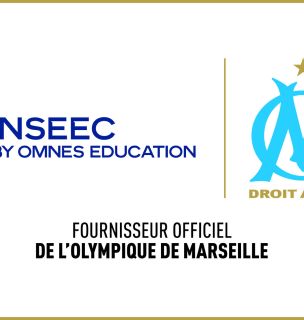The MSc Human Resources Management course
“In a particularly complex globalization environment, Human Resources are reinventing themselves to strengthen their role within the company, to be a real lever for performance and to participate fully in the creation of new values.
The MSc in Human Resources Management focuses on teaching students new concepts and digital tools of HRM, as well as helping them understand the nature and evolution of social relations within a company by 2025 and how to integrate them effectively.
It is a demanding course that addresses all aspects of tomorrow’s HR and trains operational profiles, as soon as they join the company.
Regardless of their size, the human capital of companies is a means of increasing their capacity for innovation, their competitiveness and their responsiveness. To develop this capital and make the most of it, the HR function must become a strategic business partner for the company manager.
In fact, the programme has evolved steadily and now incorporates both the traditional disciplines and skills that are essential to human resources, as well as innovative practices, in order to cope with the major upheavals that are redefining the work environment, the workforce and work itself. “
Vincent Chague, Programme Director
Training objectives
The Human Resources Manager’s mission is to define the organization’s human resources strategy and, in coordination with the senior management, to steer and monitor its implementation in the short, medium, and long term with a team they lead.
For this purpose, they are responsible for personnel administration, management, and development (including recruitment, training, career management, and salary policies). They also oversee consultation and social dialogue with staff members and/or their representatives, ensuring compliance with legal and regulatory obligations. All these tasks are carried out with a focus on inclusivity and broader respect for CSR principles.
The certification aims to train HR managers who are deeply grounded in practical realities, possess excellent analytical skills and perspective, and have a solid grasp of fundamental legal and CSR principles. They must also be capable of managing teams locally, across national territories, or within international subsidiaries.
Discover our MSc in Human Resources Management

A diploma in 1 or 2 years to become a human resources expert
This program is available in either French or 100% English, depending on the campus.
- First-year MSc coursework: 441 hours
- Second-year MSc coursework: 441 hours
How to apply for the MSc in Human Resources Management at INSEEC?
The prerequisites required
The prerequisites required to access the certification program (excluding VAE) are as follows:
- To enter the 1st year of the program (MSc1): Hold a bachelor’s degree equivalent to 180 ECTS credits in the field of human resources, management sciences, social sciences, humanities, or economics.
- To enter the 2nd year of the program (MSc2): Hold a bachelor’s degree equivalent to 240 ECTS credits validated in the field of human resources, or in some cases in a program such as Economic and Social Administration (AES), social law, humanities, psychology, or sociology.
The institution remains open to candidates from other fields of study as long as their professional project aligns coherently with their aspirations.
Would you like to know more about the MSc Human Resources Manager program?
Sign up for an Open Day!
Would you like to learn more about the admission requirements for our MSc in Human Resources Management program?
What are the courses of the Master of Science in Human Resources Management?
The courses listed below are examples only and may vary slightly depending on the campus. The content of the courses is adapted each year to market developments and is updated before the start of each new school year.
1st year courses
CROSS-DISCIPLINARY AND FUNDAMENTAL COURSES – 1ST YEAR
PROFESSIONAL TOOLS & METHODS
Resume writing, recruitment interview techniques for internship search, professional project management, team management and meeting facilitation. Negotiation techniques, transactional analysis and NLP, public speaking and stage fright management, management techniques and leadership. Skills assessment, coaching, CV digitalization and job search techniques at national and international levels, preparation for the defense of the applied research thesis.
CORPORATE STRATEGY AND BUSINESS PLAN
This module aims to teach the creation of a Business Plan: developing a quantified project for starting or expanding a business. Several steps are covered: feasibility study, market targeting, opportunities and risks, strengths and weaknesses, communication.
DECISION-SUPPORT SOFTWARE AND TOOLS
This module aims to enhance students’ IT skills to meet business demands in budget or sales tracking, project management, personnel management, and communication: Excel, Word, PowerPoint, teamwork tools, industry-specific software. It aims to excel in office tools, quickly identify and correct errors, customize existing tools, or create new ones.
BUDGET MANAGEMENT AND DASHBOARDS
The objective is to acquire key skills in budget management and reporting. Emphasis will be placed on budgetary architecture, including the implementation of summary documents, project management control and its connection with budget management, and the creation and management of dashboards.
PROFESSIONAL EXPERIENCE
The Professional Experience Report allows for showcasing the experience and expertise gained during the internship, presenting practical aspects and implemented processes.
TAKEAWAY: DATA STRUCTURING & GEN AI
Applying skills to create, format, and manipulate data in Google Sheets, using more complex functions and formulas. Learn the principles of message engineering and their impact on AI responses.
TALENT AND SKILLS
Offrir une vision globale et intégrée du management des personnes et des métiers au sein des Organisations Proposer une vision du recrutement des talents basée sur la détection de la motivation et la mise en place d’une politique de rémunération et de formation attractive
SPECIALIZED COURSES
SOCIAL LAW
Understanding the structure of social, individual, and collective relationships. Knowing and applying, through case studies, the reasoning of labor law, including various legislative, regulatory, and jurisprudential developments.
LABOR LAW
Different types of employment contracts. Employer prerogatives. Termination of employment contracts. Protected categories, discrimination, equal treatment.
MANAGEMENT & LEADERSHIP
To train professionals capable of leading and managing teams and organizations. Acquire the skills and knowledge to lead and manage both men and women. Develop leadership qualities, including vision, motivation, and communication. Adapt to changes in the world of work.
SOCIAL POLICY & INNOVATION
Effectively drive human resources and gain a strategic and operational vision of the HR function. Understand the role and missions of HR management to lead and support company changes. Definition of HRM. HRM and other functions within the company. The strategic dimension of HRM. Company performance and HRM. The structure of the HR function. Careers in HR. Innovation in HRM.
WORK AND ORGANIZATIONAL PSYCHOLOGY
Factors influencing the success of a work team. Adaptation to change and professional development: psychological barriers and motivators. Stress management at work and burnout. The effects of information and communication technologies on work and organization.
INDIVIDUAL AND COLLECTIVE BEHAVIORS IN THE ENTERPRISE
Personality, identity, and behaviors. Social ties and socialization. Hierarchy, domination, and power. Culture and social representations. Group dynamics.
ORGANIZATIONAL SPECIFICITIES AND HUMAN RESOURCE MANAGEMENT
Les difficultés de l’organisation en matière de relations humaines. Le système organisationnel et ses éléments. Les grandes approches théoriques de l’organisation. Différents types d’organisations.
RECRUITMENT TECHNIQUES
Candidate selection and integration into the company. Role of recruitment and HR planning and evaluation (GPE) in the overall HR strategy of the General Management. Recruitment tests, graphology. Types of tests commonly used by recruiters: logical and comprehension tests, personality tests, situational judgment tests.
RECRUITMENT TECHNIQUES
Candidate selection and integration into the company. Role of recruitment and HR planning and evaluation (GPE) in the overall HR strategy of the General Management. Recruitment tests, graphology. Types of tests commonly used by recruiters: logical and comprehension tests, personality tests, situational judgment tests.
COMPENSATION POLICY AND PAYSLIP
Components of compensation. Understanding the logic behind a payslip. Preparation of a payslip. Topics related to employee and employer contributions for social security and unemployment insurance. Supplementary schemes.
INTERNAL COMMUNICATION
The company in its relationship with people. Internal communication as a management tool. The corporate project. Company culture and rituals. Objectives of internal communication and available tools. Development of the internal communication plan. Proximity management, hierarchical line, and communication implications.
HR MASTERCLASS
Masterclasses in HR are organized throughout the year to explore the latest developments and trends in recruitment, retention, team management, etc.
2nd year courses
HUMAN RESOURCE STRATEGY – 2ND YEAR
HUMAN RESOURCE STRATEGY AND SOCIAL AUDIT
Effectively manage human resources and gain a strategic and operational vision of the HR function. Understand the role and missions of HR management in driving and supporting company changes. Familiarize yourself with organizational logics and their implications for management and HR management. Incorporate corporate social responsibility (CSR) into HR policies.
EMPLOYER BRAND MANAGEMENT
Définition et enjeux de la marque employeur : comprendre ce qu’est la marque employeur, ses enjeux et ses objectifs. Diagnostic de la marque employeur : analyser l’image de l’entreprise en tant qu’employeur, auprès des candidats et des collaborateurs. Stratégie de marque employeur : définir les objectifs et les actions à mener pour améliorer la marque employeur. Communication et déploiement de la marque employeur : mettre en œuvre les actions de communication et de déploiement de la marque employeur.
CROSS CULTURAL HUMAN RESOURCES MANAGEMENT
The objective is to explore and implement human resources management at the intercultural level. How to manage a multicultural team? What are the best practices?
METHODOLOGY OF APPLIED RESEARCH THESIS
The applied research thesis aims to develop analytical and reflective skills around a managerial question. It provides an opportunity to demonstrate rigor in analyzing a managerial issue and formulating operational recommendations. The research thesis reflects the research work and is structured around three key phases: literature review, qualitative and/or quantitative study and its results, and managerial recommendations.
COMPETENCIES AND QVCT
MANAGEMENT OF JOBS AND CAREER PATHS
The objective is to understand the GEPP strategy within an organization and the role of HRM in the GPEC project. The learner will be capable of grasping the various operational HR actions in a GEPP project, understanding the stakeholders involved in the process, and the organization’s obligations. The legal aspects are also covered to understand the laws and tools for effective mobility in GEPP, and to translate the project into concrete and operational actions.
MOBILITY AND EXPATRIATE MANAGEMENT
This module provides a comprehensive approach to international mobility management and expatriate management in the context of corporate challenges. It equips participants with analytical and management tools for mobility, enabling them to support the company’s international development effectively.
SOCIAL LAW AND EUROPEAN LAW
Using and managing human resources while respecting labor laws. Navigating through the hierarchy of legal texts: European law, constitution and treaties, laws and regulations, collective agreements, internal regulations, and labor code.
MANAGERIAL POLICY & LEADERSHIP
Learning management concepts and tools in managerial policies. Developing leadership skills. Analyzing managerial policies. Preparation for assuming managerial roles.
RECRUITMENT, REMUNERATION, AND PAYROLL
MANAGEMENT AND PERFORMANCE MPMO
Give meaning to teams regarding the company’s strategy. Develop a compensation policy that aligns with employees’ skills and the company’s revenue. Enhance the candidate recruitment experience. Utilize employee data to support the strategy while adhering to GDPR requirements. Drive employer branding to support the business image.
COMPENSATION POLICY AND SALARY MASS MANAGEMENT
Development and definition of a compensation policy. Components of compensation and salary scales. Qualification and individualization of compensation. Profit-sharing, employee participation, and savings plans. Control of the salary mass. Applied information technology in HR.
TRAINING POLICY AND ENGINEERING
Acquire the skills and knowledge necessary to design, implement, and evaluate training policies and programs. Develop a strategic vision of training. Adapt to changes in the world of work. Understand the importance of training in employees’ career development and as a driver of innovation and motivation within the company. Master the legal and policy context of training and the obligations of the training plan. Analyze and apply the continuous vocational training reform.
MANAGEMENT AND MEDIATION OF SOCIAL RELATIONS
Conducting conflict diagnostics. Implementation of simple and operational conflict management tools. Negotiation techniques and cooperation within teams. Prevention of moral harassment. Diagnosing a situation of moral harassment. Implementation of mediation.
RISK PREVENTION AND CRISIS MANAGEMENT
PSYCHOSOCIAL RISKS AND STRESS MANAGEMENT
Analysis of conditions and failures of mental health in the workplace. Work, fear, suffering, and illness. Methodology of observation and interpretation. Stress and burnout. Stress management at the individual level. Stress management at the organizational level.
MANAGEMENT OF RELATIONS WITH SOCIAL PARTNERS
Understanding, analyzing, and grasping the importance of collective relationships within the company (employee representative bodies, works council, employee delegates, time credits, collective conflicts, collective bargaining). Knowing the regulatory obligations concerning social partners. Learning to work with social partners.
MANAGING CHANGE AND RESTRUCTURING
Conduct a socio-organizational diagnosis of companies. Analyze strategies related to change management. Evaluate changes in perceptions and assessments of issues by various stakeholders. Identify resistance to change and promote stakeholder engagement. Master restructuring mechanisms and legal obligations. Negotiate with key stakeholders. Implement restructurings or redundancy plans under optimal conditions.
COMMUNICATION STRATEGY & CRISIS MANAGEMENT
Definition of a crisis. Preparation and anticipation of a crisis. Methodology for diagnosing and managing a crisis. Crisis communication and media training. Understanding the media environment. Implementation of public relations.
APPLIED PSYCHOLOGY IN HR
COMPUTERIZED MANAGEMENT TOOLS APPLIED TO HR
Create dashboards on the company’s sales activities: sales, orders, supplier relations, business prospecting, by sector, by amount/currency, by dates. Communicate information to various stakeholders using appropriate media: PowerPoint presentations, Word communication, creating video support (especially for creating tutorials during the implementation of a new tool, application, or business process). Software used includes Excel, Word, VBA, and professional software.
(Note: “syllabus” refers to the detailed course outline or content, which typically accompanies the translation for educational or training purposes.)
MANAGEMENT CONTROL AND HR PERFORMANCE INDICATORS
Budget management. Construction of social dashboards. Workforce management, social audit, recruitment, training, compensation.
Forecasting payroll management: development of a management model in Excel.
CSR, DIVERSITY, AND ETHICS
The objective of this module is to understand the concepts of Corporate Social Responsibility (CSR) and be able to integrate them into a Human Resources Management policy. The identification of HR indicators for non-financial reporting is also covered.
Written exams
Thesis defense
What are the enrollment dates and study schedules?
There are two openings per year, in February/March and September/October. To check the opening of each intake, contact the admissions department directly.
The pace of the course may differ from campus to campus and depending on whether the course is carried out under an internship agreement (initial) or a professionalization/apprenticeship contract (continuing).
The work-study contract must be signed for a period of 12 months (MSc2) or 24 months (MSc1 + MSc2).
To find out the duration of the contract for our Spring intake, please contact the Admissions Department of the campus that interests you.

What are the career prospects after completing an MSc in Human Resources Management?
The HR function, traditionally seen as an administrative expert, has been committed for many years to digitalizing processes such as payroll and recruitment. However, organizations of all sizes (startups, small and medium enterprises, large corporations) now expect HR to evolve into a true change facilitator for the company and a “business partner” to the top management.
HR directors tell us they are facing a challenge: initiating transformation today to attract talent, promote cross-functional collaboration, manage new work arrangements, and enhance employer branding while continuing their operational functions.
Indeed, this shift requires specialized profiles in change management capable of driving talent development, identifying/recruiting profiles that are adaptable to the jobs of tomorrow (influenced by the digitalization of roles), and championing the new social promise (quality of work life, candidate experience, employer brand), all while ensuring the company’s commitments (compensation and benefits, performance, labor law).
The achievable careers after this training include:
- Human Resources Director
- Human Resources Manager
- Human Resources Manager
- HR Development Manager
- HR Officer
- Recruitment Manager
- Training Manager
- Disability Mission Officer
- Career Management Officer
The outsourcing of certain services also leads providers to offer positions requiring the skills of a Human Resources Manager:
- HR Consultant
- Recruitment Expert / Talent Manager
Early in their career, a Human Resources Manager may occupy
To consult the detailed job descriptions by specialization.
What business skills are developed?
- Define the company’s human resources strategy and policy in accordance with the company’s strategic imperatives
- Organize and manage personnel administration with a view to optimizing costs
- Define and implement the employment and skills management policy to attract and retain skills and talents
- Define and manage the recruitment policy in order to integrate the human, technical and managerial resources necessary for the company’s growth
- Define the company’s training policy, draw up and monitor the training plan in order to develop human capital over the long term
- Implement a suitable remuneration policy and optimise the management of the wage bill in accordance with the company’s strategic and economic objectives
- Organize and lead the international mobility process and manage expatriates within the framework of an international company
- Managing teams and supporting HR projects
Description of the modalities for acquiring certification through the capitalization of skill blocks and/or by correspondence
The certification is obtained by:
- The validation of five skill blocks common to all pathways (obtaining a score of 10/20 or higher in each skill block).
- Completion of a minimum 132-day internship during the second year of the program (MSc 2).
Professional certification
Professional certification of “Human Resources Manager”, NSF code 315, granted by INSEEC (ICEE-SO, CEE-RA, CEFAS, MBA INSTITUTE), registered under number 34577 in the RNCP (Répertoire National des Certifications Professionnelles) by decision of France Compétences on 1 July, 2020.
The certification is issued once all competency blocks have been completed. All the competencies must be validated for the block to be complete. Partial validation of a block is not possible. It is also available via the Validation of Acquired Experience.
Find the competency blocks associated with this RNCP title by clicking here.
The certification is obtained by capitalisation of all the blocks of skills.
What are the teaching methods for the MSc in Human Resources Management?
Teaching methods
- Lectures or/and interactive courses
- Situational exercises through collective or/and individual case studies carried out by the students
- Conferences, seminars or/and educational visits
Evaluation methods
- Individual or/and group case studies
- Individual or/and group oral presentations
- Individual or/and group files
- Applied research thesis with individual oral presentation
Methods and tools
- The evaluation methods are face-to-face, in the form of continuous assessment or final exams in the form of mid-term exams.
What is the 2025/2026 tuition fee to enter the program?
SPRING INTAKE – 2025
Initial training:
- MSc1: € 11,950
- MSc2: € 13,350
Apprenticeship program:
- 24 months: €23,950 before tax
- MSc2: €13,950 before tax
International students pack
Mandatory fee of €490 for exclusive support services for international students living outside the European Union.
FALL INTAKE – 2025
Initial training:
- MSc1: €12,190
- MSc2: €12,950
Apprenticeship program:
- 24 months: €24,450 before tax
- MSc2: €14,290 before tax
International students pack
Mandatory fee of €700 for exclusive support services for international students living outside the European Union.
In the context of work-study training, tuition fees are payable by the OPCO and the company signing the contract.
Do you have any questions about work-study or our school in general? Consult our frequently asked questions.
VAE/VAP
- VAE: €4,800 before tax
- VAP: €850 before tax
International students pack
Mandatory fee for exclusive support services for international students living outside the European Union.
- Spring intake (2025) – February/March: €490
- Fall intake (2025) – September/October: €700
Application fee
The application fee is €80.
What kind of financial help is available?
INSEEC offers several financial aid schemes:
- The alternating rhythm, in internship or work-study contract
- The right to training via the CPF
- Banking partnerships
KEY NUMBERS FOR THE MSc HUMAN RESOURCES MANAGER
98%
National success rate
Class of 2023
99%
Presentation rate
Class of 2023
95%
Overall employment rate
Class of 2022
79%
Satisfaction rate at 6 months
Class of 2022
Disabilities
The OMNES Education Group pays particular attention to the societal environment, including the disability dimension. Indeed, we believe that students with disabilities should not have any problems in pursuing their studies and starting a professional career. We accompany them to facilitate their access to the premises, offer them personalized advice as well as adapted accommodations throughout their school career.
Accessibility of premises: all our campuses are accessible to people with disabilities.
To learn more about the OMNES Education Group’s disability policy, click here.
Contacts for disability referents by campus:
- Bordeaux : Maxime DOUENS – mdouens@inseec.com
- Lyon : Anissa GASMI – agasmi@inseec.com
- Rennes : Laura LE CALVEZ – llecalvez@omneseducation.com
- Paris : Farid HAMAD – fhamad@inseec.com
- Chambéry : Clément BERTACCO – cbertacco@inseec.com
- Marseille : Océane VALOTTI – ovalotti@omneseducation.com
- Toulouse : Amanda MARNEIX – amarneix@omneseducation.com
News

June 2024
INSEEC hosted the CFNews Grands Prix de la Croissance Externe Sud Ouest for the second year running
Read more





